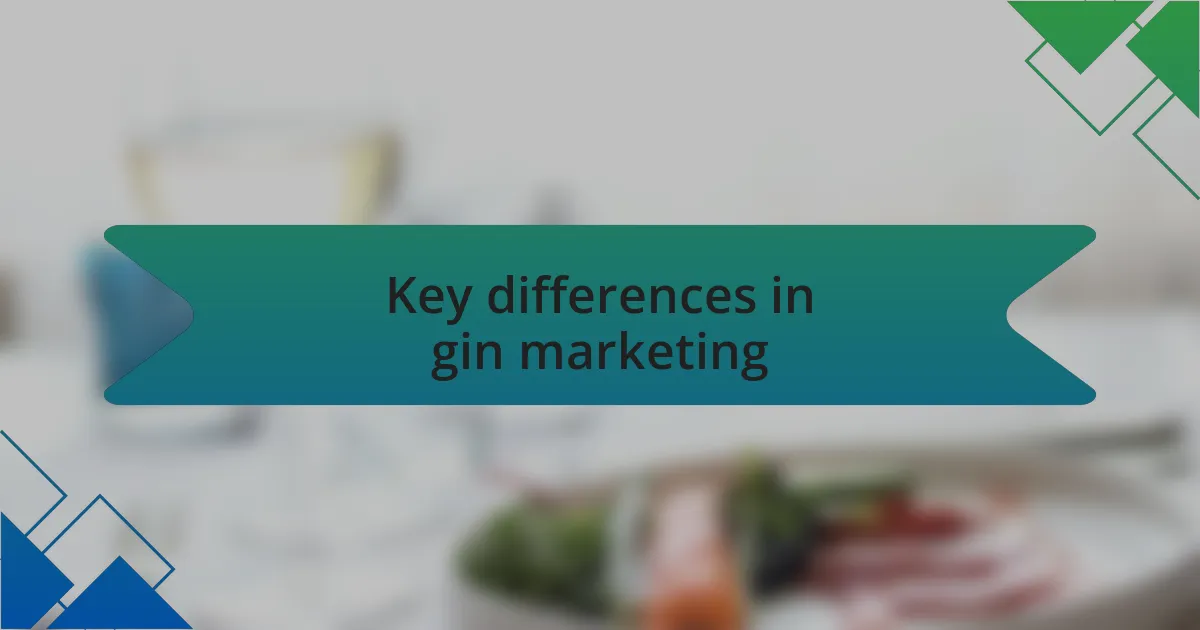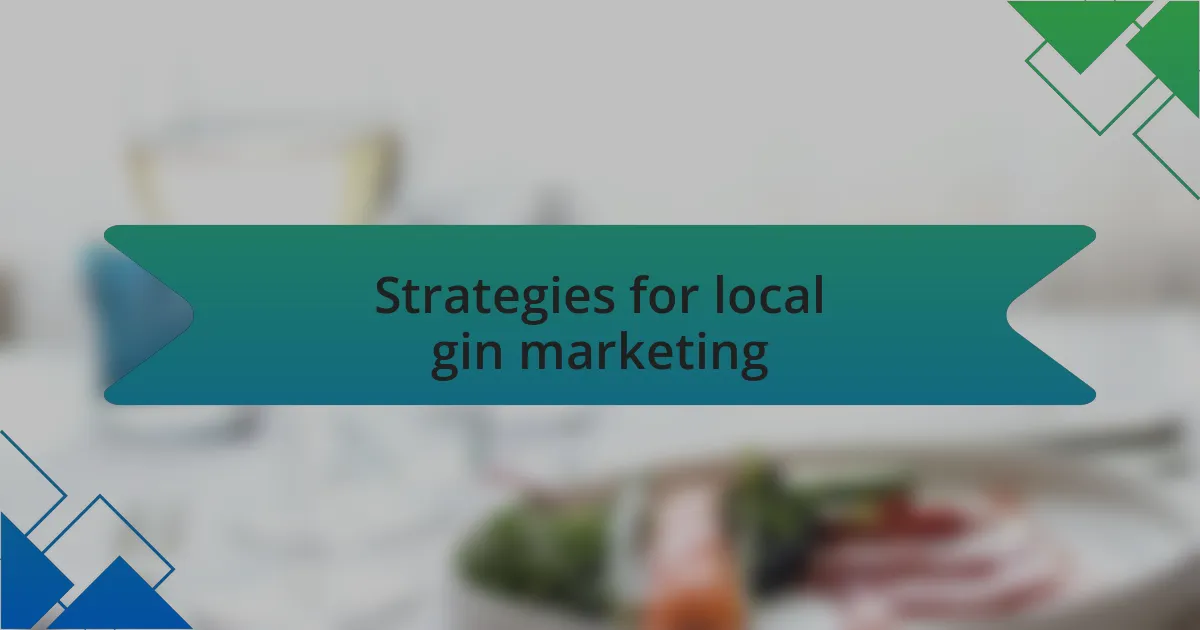Key takeaways:
- Local gin markets are influenced by cultural heritage and community connections, enhancing shared experiences.
- Global gin marketing requires understanding diverse consumer preferences and adapting strategies for different cultures.
- Storytelling and personal narratives are crucial in distinguishing local brands from larger competitors.
- Digital strategies and international partnerships are essential for expanding and enhancing brand visibility worldwide.

Understanding local gin markets
When diving into local gin markets, I often reflect on how unique the cultural influences can be. For instance, my visit to a distillery in a quaint seaside town opened my eyes to the way local ingredients, like botanicals from the region, can shape flavor profiles. It made me wonder—how much does a place’s heritage really affect the gin we ultimately taste?
Local gin markets thrive on community connections. I remember attending a pop-up tasting event that brought together local artisans and enthusiasts, creating a vibrant atmosphere. It struck me that these gatherings not only promote the products but also foster relationships, making gin feel more like a shared experience rather than just a beverage.
Understanding the competitive landscape of local gin is crucial. In my experience, I’ve seen small distilleries leverage their unique stories to distinguish themselves from larger brands. This raises an interesting question: What role does storytelling play in a consumer’s choice? The compelling narratives behind local brands can resonate deeply, often swaying preferences in their favor, and that’s where the magic happens.

Understanding global gin markets
Understanding global gin markets requires an appreciation of diverse consumer preferences across different cultures. I once attended an international beverage expo where I noticed enthusiasts from various countries reacting differently to the same gin samples. It made me realize that while botanicals matter, cultural context, such as drinking traditions and presentation, significantly influences how gin is perceived globally.
The competition in global markets is fierce and constantly evolving. For instance, during a recent conversation with a distillery owner, I learned how they had to adapt their marketing strategies to resonate with international audiences. It got me thinking—what strategies can truly capture the hearts of drinkers beyond local borders? The answer often lies in blending authenticity with a global narrative that appeals to a universal palate while respecting regional nuances.
One of the most compelling aspects of the global gin landscape is the advance of craft distilling. I’ve had the pleasure of sampling gins from far-flung corners of the world—each offering a unique twist on traditional recipes. Have you ever wondered how a small batch from a sun-drenched Mediterranean island compares to a classic London dry? These experiences highlight that gin isn’t just a drink but a global story waiting to be explored.

Key differences in gin marketing
When it comes to gin marketing, one major difference lies in the messaging tailored for local versus global consumers. I remember a time when I worked on a campaign for a local gin brand that focused on its heritage and community connections. This approach resonated deeply with locals who appreciated the story behind the brand, highlighting how their spirits were crafted from locally sourced botanicals. But what happens when you shift that focus to an international audience? The narrative must evolve; it’s not just about locality anymore but about a broader connection to craft and quality that transcends borders.
Next, consider the distribution channels that vary dramatically. In my experience with gin brands, local markets often rely on intimate relationships with bars and restaurants, resulting in personalized tasting events that foster direct engagement. But in global markets, scaling these efforts can be challenging. Instead, I recall a time when a global gin brand successfully used online platforms to reach consumers directly. It got me thinking: how can local distilleries embrace digital strategies to enhance their visibility without losing that personal touch?
Lastly, pricing strategies often highlight notable differences. During a recent consultation with a distillery, they mentioned how pricing adjusts based on market positioning. In local markets, there’s often a sense of loyalty that can allow for premium pricing. Conversely, in international markets, brands frequently adopt competitive pricing strategies to gain shelf space and attract first-time buyers. Have you ever thought about how that can affect brand perception? My take is that while localization can create a loyal customer base, understanding global pricing strategies is key to expanding reach without alienating existing fans.

Strategies for local gin marketing
Focusing on local partnerships can be a game changer for gin marketing. For instance, I once collaborated with a local bar to host gin tasting nights, where the distillery’s story was shared over crafted cocktails. This event fostered a sense of community and connection, allowing patrons to feel personally invested in the brand, which, in my opinion, is invaluable for local marketing.
Leveraging social media also plays a crucial role in connecting with local consumers. I remember a local gin brand that created a series of short videos featuring distillers discussing their process and inspirations. It not only educated the audience but also humanized the brand, making it relatable. How often do you find yourself drawn to a product because you feel a story behind it? Personal stories make a gin brand more than just a bottle on the shelf; they create a memorable experience that resonates with local consumers.
Additionally, organizing community events can significantly enhance brand visibility. I once attended a local farmers’ market where a gin distillery showcased its products, offering samples to curious passersby. The enthusiasm of the team, combined with the chance to engage directly with potential customers, illustrated the importance of being present in your local scene. Isn’t it fascinating how face-to-face interactions can create lasting impressions that no advertisement can match?

Strategies for global gin marketing
Expanding into global markets requires a robust understanding of diverse consumer preferences and cultural nuances. In my experience, adopting a localized approach for each new market can be incredibly effective. I remember working with a gin brand that adjusted their flavor profiles and marketing campaigns to match regional tastes, which significantly boosted their appeal. Have you ever considered how much a small tweak in flavor or messaging could make a gin brand resonate on the other side of the world?
Building strong international partnerships is another cornerstone of successful global marketing. When I collaborated with a foreign distributor who shared our brand ethos, it opened doors to new opportunities. We hosted joint events that not only showcased our gin but also celebrated local traditions, creating an emotional connection with the audience. Isn’t it remarkable how shared values can bridge cultural gaps and foster loyalty across borders?
Lastly, a savvy digital strategy is indispensable in today’s interconnected world. I once saw a small gin distillery harness the power of targeted online campaigns, tailoring their ads to specific markets based on extensive research. The result was a dramatic increase in both engagement and sales. Doesn’t it make you wonder how effectively utilizing digital tools could shape the future of gin marketing on a global scale?